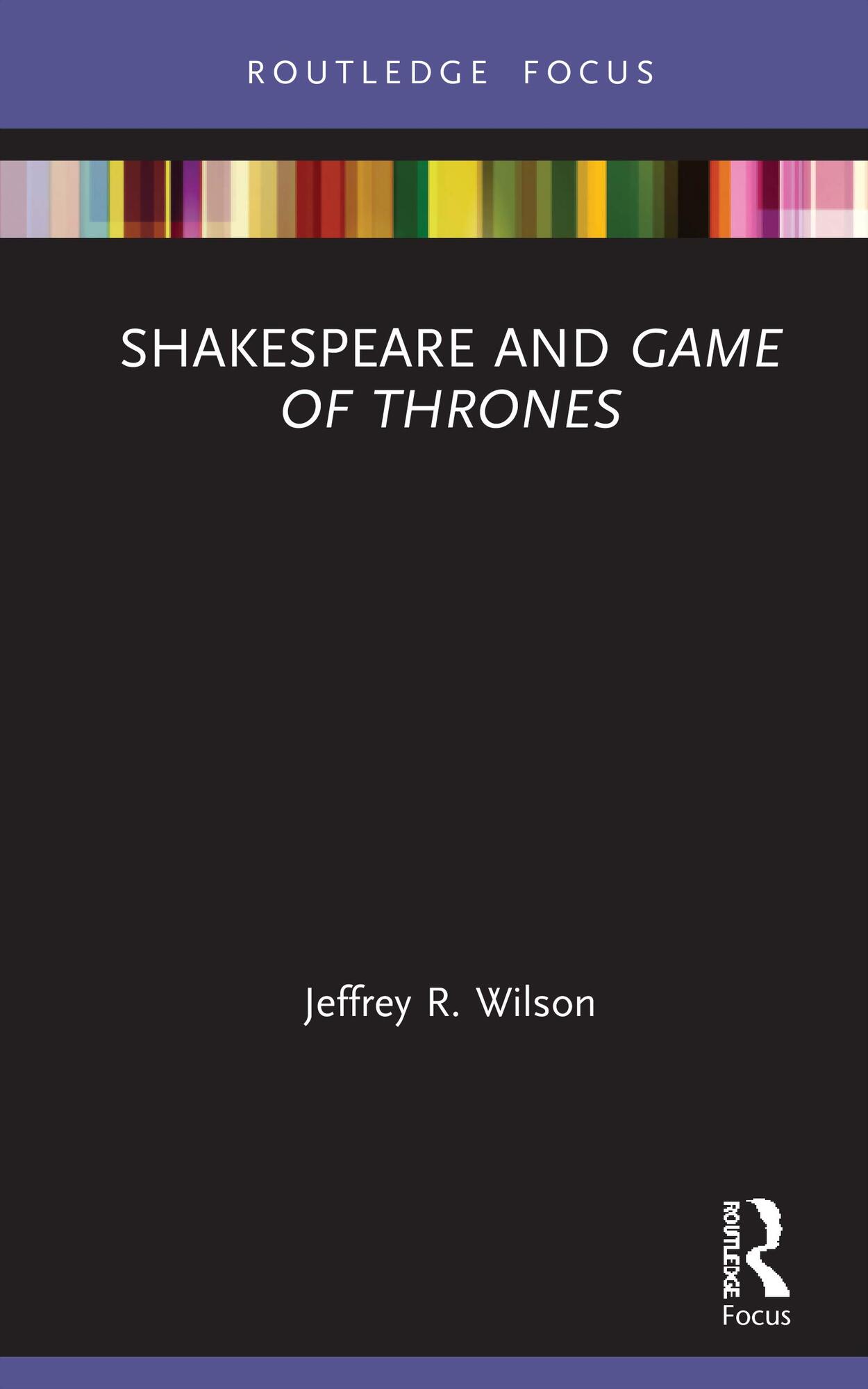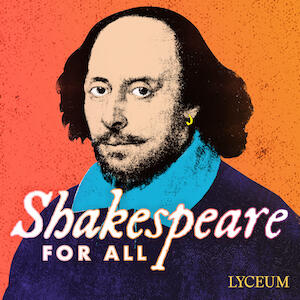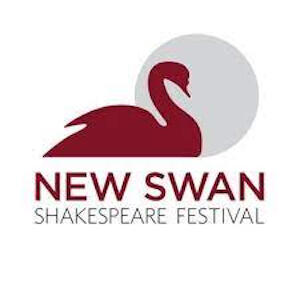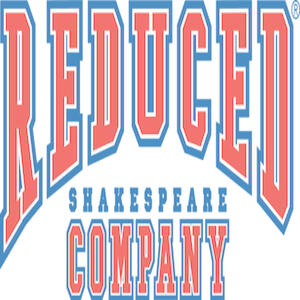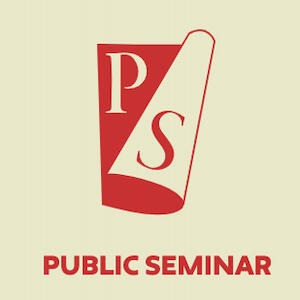Lakowski, Romuald Ian. “From History to Myth: The Misogyny of Richard III in More’s History and Shakespeare’s Play.” QWERTY 9 (1999): 15-23.
Lambert, Charles. “A Tender Spot in My Heart.” Critical Quarterly 57.1 (2015): 20-33.
Lanham, Andrew. “Shakespearean Echoes: Game of Thrones as History Play,” The Millions (July 10, 2017), https://themillions.com/2017/07/shakespearean-echoes-game-thrones-histor...
Lanier, Douglas. “Recent Shakespeare Adaptation and the Mutations of Cultural Capital,” Shakespeare Studies 38 (2010): 104-13.
Lanier, Douglas. “Shakespearean Rhizomatics: Adaptation, Ethics, Value.” Shakespeare and the Ethics of Appropriation, ed. Alexander Huang and Elizabeth Rivlin (New York: Palgrave, 2014): 21-40.
Larrington, Carolyne. Winter is Coming: The Medieval World of Game of Thrones. London; I.B.Tauris, 2016.
Leverette, Marc, Brian L. Ott, and Cara Louise Buckley, eds. It’s Not TV: Watching HBO in the Post-Television Era. New York: Routledge, 2008.
Levin, Carole. The Heart and Stomach of a King: Elizabeth I and the Politics of Sex and Power. 2nd ed. Philadelphia: University of Pennsylvania Press, 2013.
Levine, Nina S. “The Case of Eleanor Cobham: Authorizing History in 2 Henry VI.” Shakespeare Studies 22 (1994): 104-21.
Levine, Nina S. Women’s Matters: Politics, Gender, and Nation in Shakespeare’s Early History Plays. Newark: University of Delaware Press, 1998.
Liedl, Janice. “Unbowed, Unbent, Unaccepted: Disputing Women’s Roles in Game of Thrones.” Fan Phenomena: Game of Thrones, ed. Kavita Mudan Finn (Bristol: Intellect, 2017): 128-39.
Lushkov, Ayelet Haimson. You Win or You Die: The Ancient World of Game of Thrones. London: Bloomsbury, 2017.
MacNeil, William P. “Machiavellian Fantasy and the Game of Laws,” Critical Quarterly 57.1 (2015): 34-48.
Mandall, Tom. “Mothers, Murder, and Gender Transgression: Queen Margaret in Henry VI Part 3.” Birmingham Journal of Literature and Language 4 (2012): 6-15.
Mantoan, Lindsey, and Sara Brady, eds. Vying for the Iron Throne: Essays on Power, Gender, Death and Performance in HBO’s Game of Thrones. Jefferson: McFarland, 2018.
Marcus, Leah “Elizabeth.” Puzzling Shakespeare: Local Reading and Its Discontents. Berkeley: University of California Press, 1988. 51-105;
Mares, Nicole M. “Writing the Rules of Their Own Game: Medieval Female Agency and Game of Thrones.” Game of Thrones Versus History: Written in Blood, ed. Brian Pavlac (Hoboken: Wiley Blackwell, 2017): 147-60.
Marsden, Jean I. The Re-imagined Text: Shakespeare, Adaptation, and Eighteenth-Century Literary Theory. Lexington: University Press of Kentucky, 1995.
Marsden, Jean, ed. The Appropriation of Shakespeare: Post-Renaissance Reconstructions of the Works and the Myth. New York: Hemel Hempstead, 1991.
Marshall, Kate. “Atlas of a Concave World: Game of Thrones and the Historical Novel.” Critical Quarterly 57.1 (2015): 61-70.
Massie, Pascal J., and Lauryn S. Mayer. “Bringing Elsewhere Home: A Song of Ice and Fire’s Ethics of Disability,” Studies in Medievalism 23 (2014): 45-59.
McCall, Jessica, and Kavita Mudan Finn, “Exit, pursued by a fan: Shakespeare, Fandom, and the Lure of the Alternate Universe.” Shakespeare and Creative Criticism, ed. Rob Conkie and Scott Maisano (New York: Berghahn, 2019): 38-53;
Mondschein, Ken. Game of Thrones and the Medieval Art of War. Jefferson: McFarland, 2017.
Moulton, Ian Frederick. “‘A monster great deformed’: The Unruly Masculinity of Richard III,” Shakespeare Quarterly 47 (1996): 251-68;
Mullin, Romano. “Tweeting Television/Broadcasting the Bard: @HollowCrownFans and Digital Shakesperes.” Broadcast Your Shakespeare: Continuity and Change Across Media, ed. Stephen O’Neill (London: Bloomsbury, 2018): 207-26.
Muno, Wolfgang. “‘Winter is Coming?’ Game of Thrones and Realist Thinking.” The Interplay Between Political Theory and Movies: Bridging Two Worlds, ed. Ulrich Hamenstädt (Heidelberg: Springer 2019): 135-49.
Napolitano, Marc. “‘Sing for Your Little Life’: Story, Discourse and Character.” Mastering the Game of Thrones: Essays on George R.R. Martin’s A Song of Ice and Fire, ed. Jes Battis and Susan Johnston (Jefferson: McFarland, 2015): 35-56.
Nason, Arthur Huntington. “Shakespeare’s Use of Comedy in Tragedy.” The Sewanee Review 14.1 (1906): 28-37.
Needham, Jessica Kathryn. “Visual Misogyny: An Analysis of Female Sexual Objectification in Game of Thrones,” Femspec 17.2 (2017): 3-19.
Newlin, James. “Foul Pranks: Recognizing Vice Principals as a Comic Othello.” Shakespeare Bulletin 36.2: 197–223.
O’Brien, Sheilagh Ilona. “Wicked Women and the Iron Throne: The Twofold Tragedy of Witches as Advisors in Game of Thrones.” Queenship and the Women of Westeros: 205-30.
O’Leary, Peter. “Sacred Fantasy in Game of Thrones.” Critical Quarterly 57.1 (2015): 6-19.
O’Neill, Stephen. Staging Ireland: Representations in Shakespeare and Renaissance Drama. Dublin: Four Courts, 2007.
Pavlac, Brian, ed. Game of Thrones versus History: Written in Blood,. Hoboken: Wiley Blackwell, 2017.
Paxson, James J. “Shakespeare’s Medieval Devils and Joan la Pucelle in 1 Henry VI: Semiotics, Iconography, and Feminist Criticism.” Henry VI: Critical Essays, ed. Thomas A. Pendleton (New York: Routledge, 2001): 127-55;
Penlington, Amanda. “‘Not a man from England’: Assimilating the Exotic ‘Other’ through Performance, from Henry IVto Henry VI,” in This England, That Shakespeare: New Angles on Englishness and the Bard, ed. Willy Maley and Margaret Tudeau-Clayton (Burlington: Ashgate, 2010): 165-83.
Perry, Curtis, and John Watkins, eds. Shakespeare and the Middle Ages. Oxford: Oxford University Press, 2009), esp. Part II with chapters by Patrick Cheney, William Kuskin, Brian Walsh, and Curtis Perry: 103-98.
Pierce, Jeremy. “Bran, Hodor, and Disability in Westeros,” in Ultimate Game of Thrones and Philosophy, 101-08.
Pope, Johnathan H. Shakespeare’s Fans: Adapting the Bard in the Age of Media Fandom. New York: Palgrave, 2020.
Pugh, Catherine. “Harder and Stronger: Yara Greyjoy and the Ironborn.” Vying for the Iron Throne, 79-89.
Pugliatti, Paola. Shakespeare the Historian. New York: Palgrave Macmillan, 1996.
Quercia, Jacopo della. “A Machiavellian Discourse on Game of Thrones.” Game of Thrones versus History: Written in Blood, ed. Brian Pavlac (Hoboken: Wiley Blackwell, 2017): 33-46.
Rabkin, Norman “Rabbits, Ducks, and Henry V.” Shakespeare Quarterly 28.3 (1977): 279-96.
Rackin, Phyllis “Anti-Historians: Women’s Roles in Shakespeare’s Histories.” Theatre Journal 37 (1985): 329-44.
Rackin, Phyllis. Stages of History: Shakespeare’s English Chronicles. Ithaca: Cornell University Press, 1990.
Rennick, Steph. “Prophetic Foreknowledge in Game of Thrones.” The Ultimate Game of Thrones and Philosophy: You Think or Die, ed. Eric J. Silverman and Robert Arp (Chicago: Open Court, 2017): 151-57.
Reynolds, Bryan. Transversal Subjects: From Montaigne to Deleuze after Derrida. New York: Palgrave Macmillan, 2009.
Reynolds, Bryan, and Donald Hedrick. “Shakespace and Transversal Power.” Shakespeare without Class: Misappropriations of Cultural Capital, ed. Reynolds and Hendrick (New York: Palgrave, 2000): 3-47.
Rodgers, Amy. “History as Echo: Entertainment Historiography from Shakespeare to HBO’s Game of Thrones.” Shakespearean Echoes, ed. Adam Hansen and Kevin J. Wetmore, Jr. (New York: Palgrave Macmillan, 2015): 142-54,
Rohr, Zita Eva, and Lisa Benz, Introduction to Queenship and the Women of Westeros,
Roman, Christopher. “The Ethical Movement of Daenerys Targaryen.” Ethics and Medievalism, ed. Karl Fugelso (Cambridge: D. S. Brewer; 2014): 55-75.
Rosa, Evan. “Jon Snow, a Misshapen Christ Figure,” in Ultimate Game of Thrones and Philosophy.
Rossini, Manuela S. “The Sexual/Textual Impossibility of Female Heroism in the First Tetralogy.” Shakespeare Yearbook14 (2004): 45-78.
Rowan, Nicole. “Is There a Woman in This Text? Female Domination in Shakespeare’s Henry VI.” Links and Letters 2 (1995): 31-45.
Royster, Francesca T. “The Chicago Shakespeare Theater’s Rose Rage: Whiteness, Terror, and the Fleshwork of Theatre in a Post-Colorblind Age,” in Colorblind Shakespeare: New Perspectives on Race and Performance, ed. Ayanna Thompson (New York: Routledge, 2006), 221-39.
Rozett, Martha Tuck. Constructing a World: Shakespeare’s England and the New Historical Fiction. Albany: State University of New York Press, 2003.
Ruiz, José Luis De Ramón. “The Favor of the Gods: Religion and Power in George R. R. Martin’s A Song of Ice and Fire.” Fafnir—Nordic Journal of Science Fiction and Fantasy Research 3.3 (2009): 41-50.
Ryan, Patrick. “Shakespeare’s Joan and the Great Whore of Babylon.” Renaissance and Reformation 28.4 (2004): 55-82.
Sarikakis, Katharine, Claudia Krug, and Joan Ramon Rodriguez-Amat. “Defining Authorship in User-Generated Content: Copyright Struggles in The Game of Thrones.” New Media & Society 19.4 (2017): 542-59.
Schubart, Rikke. “Woman with Dragons: Daenerys, Pride, and Postfeminist Possibilities.” Women of Ice and Fire: Gender Game of Thrones, and Multiple Media Engagements, ed. Anne Gjelsvik and Rikke Schubart (London: Bloomsbury, 2016): 105-30.
Schulzke, Marcus. “Playing the Game of Thrones: Some Lessons from Machiavelli.” Game of Thrones and Philosophy,33-48.
Schwarz, Kathryn. “A Tragedy of Good Intentions: Maternal Agency in 3 Henry VI and King John.” Renaissance Drama32 (2003), 225-54.
Schwyzer, Philip. Shakespeare and the Remains of Richard III. Oxford: Oxford University Press, 2013.
Seale, Yvonne. “The Multi-Cultural Middle Ages: An Annotated Bibliography for Teachers.” The Once and Future Classroom: Resources for Teaching the Middle Ages 14.1 (Fall 2017), https://once-and-future-classroom.org/the-multicultural-middle-ages-an-a....
Shacklock, Zoë. “‘A reader lives a thousand lives before he dies’: Transmedia Textuality and the Flows of Adaptation.” Mastering the Game of Thrones: Essays on George R.R. Martin’s A Song of Ice and Fire, ed. Jes Battis and Susan Johnston (Jefferson: McFarland, 2015): 262-80.
Shippey, Tom. “Medievalisms and Why They Matter.” Studies in Medievalism 17 (2009): 45-54.
Sigrist, Michael J. “Fate, Freedom, and Authenticity in A Game of Thrones.” Game of Thrones and Philosophy: Logic Cuts Deeper than Swords, ed. Henry Jacoby (Hoboken: Wiley, 2012): 223-35.
Sloboda, Noel. “Hamlet in (and off) Stages: Television, Serialization, and Shakespeare in Sons of Anarchy.” Journal of the Wooden O Symposium 12 (2012): 85-99.
Smith, Kristin M. “Martial Maids and Murdering Mothers: Women, Witchcraft and Motherly Transgression in Henry VIand Richard III,” Shakespeare 3.2 (2007): 143-60.
Snyder, Susan. The Comic Matrix of Shakespeare’s Tragedies: Romeo and Juliet, Hamlet, Othello, and King Lear. Princeton: Princeton University Press, 1979.
Stanton, Courtney. “Learn to Fight with Your Other Hand: Game of Thrones as a Complicated Champion of Disability.” Fan Phenomena: Game of Thrones, ed. Kavita Mudan Finn (Bristol: Intellect, 2017): 140-50.
Stanton, Kay. “A Presentist Analysis of Joan, la Pucelle: ‘What’s past and what’s to come she can descry’.” Presentism, Gender, and Sexuality in Shakespeare, ed. Evelyn Gajowski (New York: Palgrave Macmillan, 2009): 103-21.
Stockton, Kathryn. “Lost, or ‘Exit, pursued by a bear’: Causing Queer Children on Shakespeare’s TV.” Shakesqueer: A Queer Companion to the Complete Works of Shakespeare, ed. Madhavi Menon (Durham: Duke University Press, 2011): 421-28;
Sturtevant, Paul B., ed. Race, Racism, and the Middle Ages. The Public Medievalist, (2017-Pres.), https://www.publicmedievalist.com/race-racism-middle-ages-toc/;
Suzman, Janet. “The Two Joans.” Not Hamlet: Meditations on the Frail Position of Women in Drama (London: Oberon, 2012).
Swiderski, Lauren. “The Influence of Shakespeare in A Song of Ice and Fire and Game of Thrones,” at the second annual Con of Thrones in Dallas, TX (May 2018),
Swiderski, Lauren. “Stannis Baratheon: Macbeth Revisited.” Shakespeare of Thrones (May 18, 2018), https://shakespeareofthrones.com/2018/05/18/stannis-baratheon-macbeth-re....
Swiderski, Lauren. Shakespeare of Thrones, https://shakespeareofthrones.com.
Szalay, Michael. “HBO’s Flexible Gold.” Representations 126.1 (2014): 112-34.
Tasker, Yvonne, and Lindsay Steenberg, “Women Warriors from Chivalry to Vengeance,” in Women of Fire and Ice, 171-92.
Taylor, Gary, and Rory Loughnane. “The Canon and Chronology of Shakespeare’s Works.” The New Oxford Shakespeare: Authorship Companion, ed. Gary Taylor and Gabriel Egan (Oxford: Oxford University Press, 2017): 417-602.
Terris, Olwen. “Shakespeare and British Television.” Shakespeare Survey 61 (2008): 199-212.
Tillyard, E.M.W. Shakespeare’s History Plays. London: Chatto & Windus, 1944.
Tricomi, Albert H. “Joan la Pucelle and the Inverted Saints Play in 1 Henry VI.” Renaissance and Reformation 25.2 (2001): 5-31.
Tufekci, Zeynep. “The Real Reason Fans Hate the Last Season of Game of Thrones.” Scientific American (May 17, 2019), https://blogs.scientificamerican.com/observations/the-real-reason-fans-h....
Underwood, Lori J. “Sex, Consent, and Rape in Westeros.” Ultimate Game of Thrones and Philosophy, 133-39.
Utz, Richard. “Coming to Terms with Medievalism.” European Journal of English Studies 15.2 (2011): 101-13.
Utz, Richard. “‘Game of Thrones’ Among the Medievalists.” Inside Higher Ed (July 14, 2017), https://www.insidehighered.com/views/2017/07/14/why-game-thrones-shouldn...
Venning, Dan. “Game of Thrones as Gesamtkunstwerk: Adapting Shakespeare and Wagner,” in Vying for the Iron Throne: Essays on Power, Gender, Death, and Performance in HBO’s Game of Thrones, ed. Lindsey Mantoan and Sara Brady (Jefferson: McFarland, 2018): 148-58.
Walker, Jessica. “Incapable of His Own Distress: Genderbending Ophelia.” Bonds of Brotherhood in Sons of Anarchy: Essays on Masculinity in the FX Series, ed. Susan Fanetti (Jefferson: McFarland & Co., 2018): 65-76.
Walker, Jessica. “‘Just songs in the end’: Historical Discourses in Shakespeare and Martin.” Mastering the Game of Thrones: Essays on George R.R. Martin’s A Song of Ice and Fire, ed. Jes Battis and Susan Johnston (Jefferson: McFarland, 2015): 71-92.
Walsh, Brian. Shakespeare, the Queen’s Men, and the Elizabethan Performance of History. Cambridge: Cambridge University Press, 2009.
Walton, Priscilla L. “‘You Win or You Die’: The Royal Flush of Power in Game of Thrones.” Canadian Review of American Studies 49.1 (2019): 99-114.
Waltonen, Karma. “Saint Joan: From Renaissance Witch to New Woman,” Shaw: The Annual of Bernard Shaw Studies 24 (2004): 186-203.
Waugh, Lisa. “Everything Game of Thrones Stole from Shakespeare.” Ranker (n.d.), https://www.ranker.com/list/things-game-of-thrones-took-from-shakespeare....
Weinczok, David C. The History Behind Game of Thrones: The North Remembers. Havertown: Pen & Sword, 2019.
Wells, Stanley. Shakespeare and Co.: Christopher Marlowe, Thomas Dekker, Ben Jonson, Thomas Middleton, John Fletcher and the Other Players in His Story. London: Allen Lane, 2006.
Wells-Lassagne, Shannon. “Prurient Pleasures: Adapting Fantasy to HBO.” Journal of Adaptation in Film & Performance6.3 (2013): 415-26.
West, Ed. Iron, Fire and Ice: The Real History that Inspired Game of Thrones. New York: Skyhorse, 2019.
Wetmore, Kevin J., and Adam Hansen, Jr., eds. Shakespearean Echoes. New York: Palgrave Macmillan, 2015.
Whitver, H. Austin. “Erecting a Pyramid in France: Tomb Symbolism in 1 Henry VI.” Journal for Early Modern Cultural Studies 15.3 (2015): 82-101.
Williams, Deanne. “Medievalism in English Renaissance Literature.” A Companion to Tudor Literature, ed. Kent A. Cartwright (Oxford: Wiley Blackwell, 2010): 213-27;
Williams, Deanne. “Shakespearean Medievalism and the Limits of Periodization in Cymbeline.” Literature Compass 8.6 (2011): 390-403.
Williams, Nora J. “@Shakespeare and @TwasFletcher: Performances of Authority.” Humanities 46 8.1 (2019); https://doi.org/10.3390/h8010046.
Winckler, Reto. “This Great Stage of Androids: Westworld, Shakespeare, and the World as Stage.” Journal of Adaptation in Film & Performance 10.2 (2017): 169-88.
Wolfe, Rachel M.E. “The ‘Most Shocking’ Death: Adaptation, Femininity and Victimhood in the Human Sacrifice of Shireen Baratheon.” Vying for the Iron Throne: Essays on Power, Gender, Death and Performance in HBO’s Game of Thrones, ed. Lindsey Mantoan, Sara Brady (Jefferson: McFarland, 2018): 95-108.
Yan, Jun. “Shakespeare’s Shadow on Game of Thrones: The Art of Villainy.” History Behind Game of Thrones (Oct. 23, 2014), http://history-behind-game-of-thrones.com/warofroses/richardiii/villainy;
Young, Joseph Rex. George R.R. Martin and the Fantasy Form. New York: Routledge, 2019.
Young, Helen. “Game of Thrones’ Racism Problem,” The Public Medievalist (July 21, 2017), https://www.publicmedievalist.com/game-thrones-racism-problem/;
Young, Helen. “The Real Middle Ages: Dirty Fantasy.” Race and Popular Fantasy Literature: Habits of Whiteness (New York: Routledge, 2016): 63-87.
